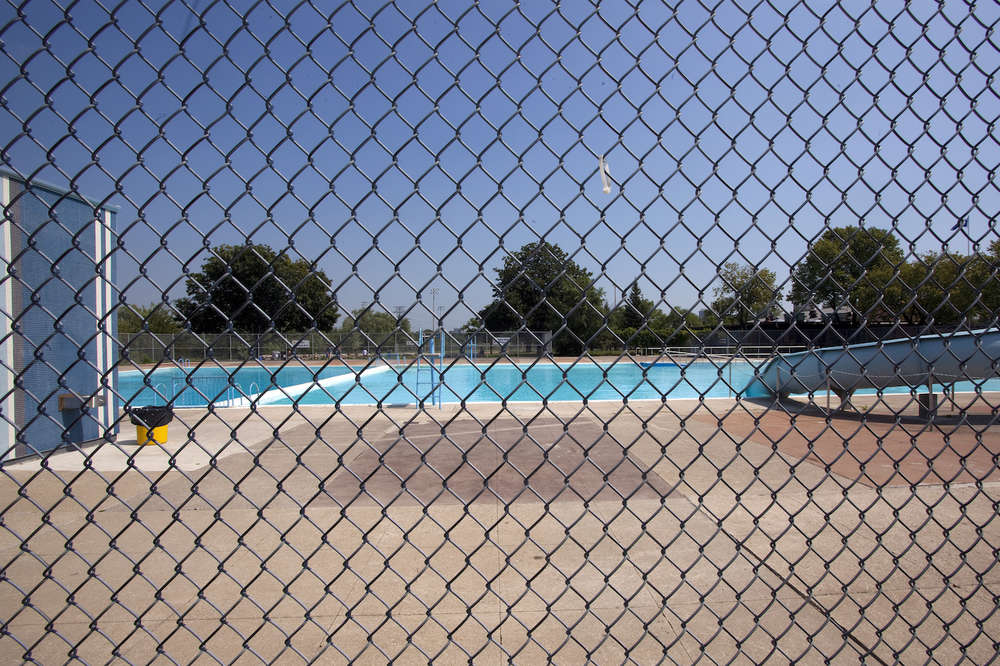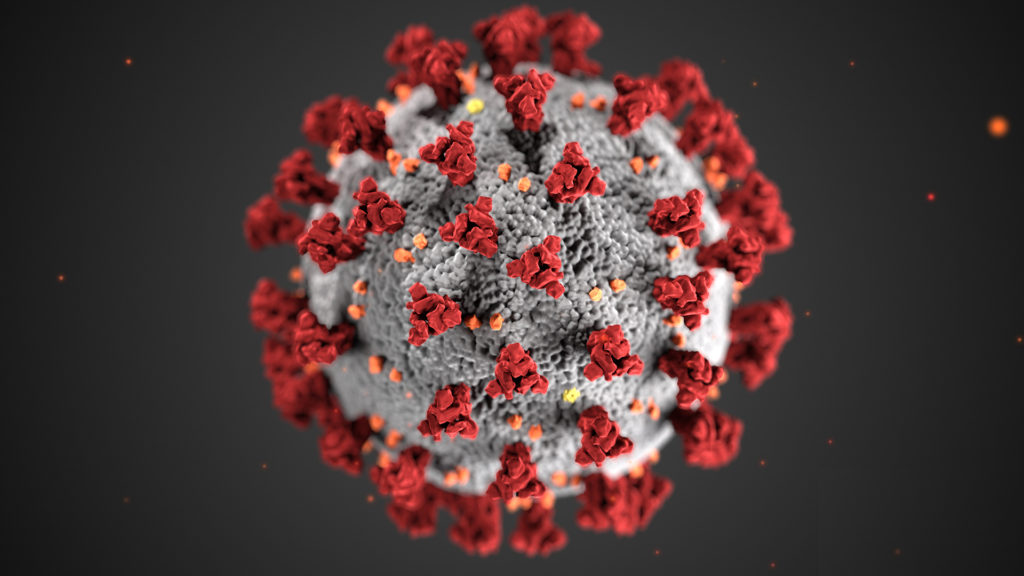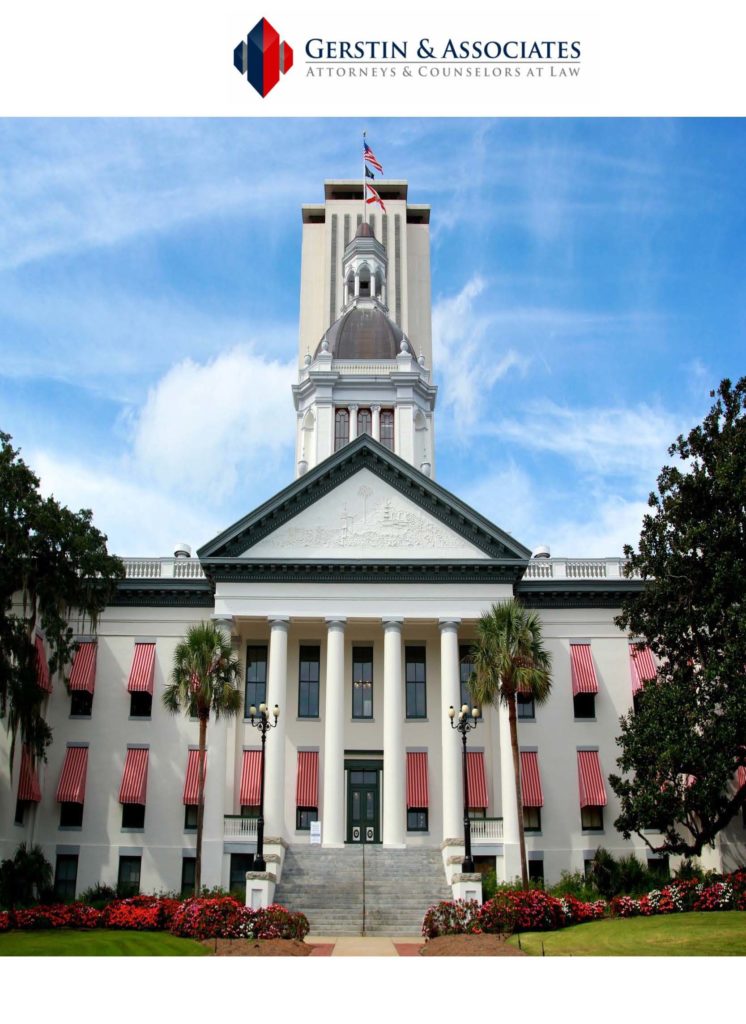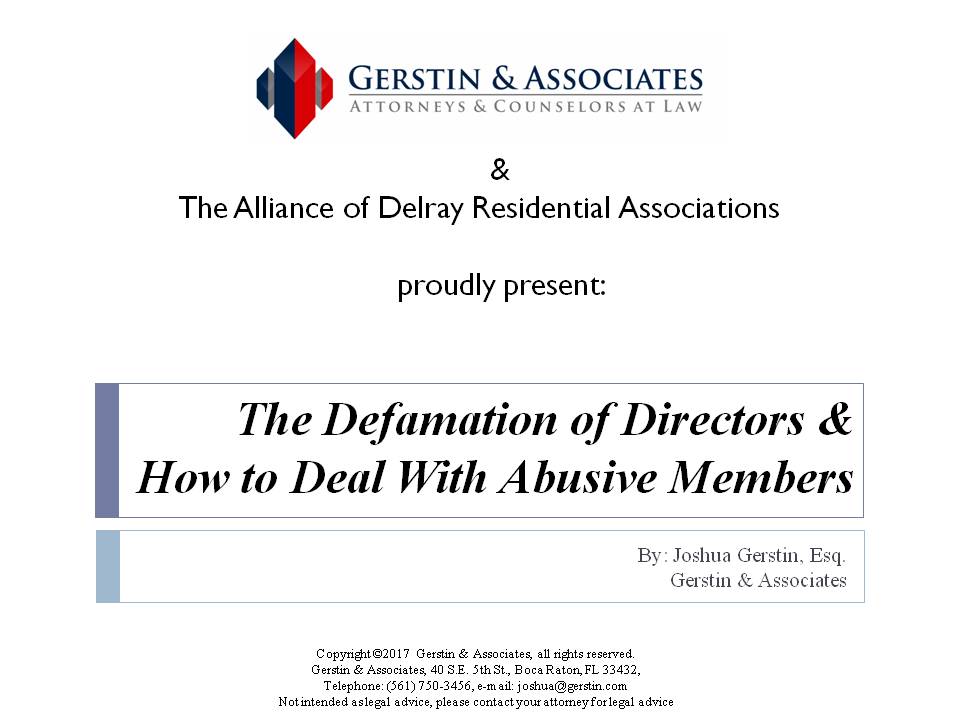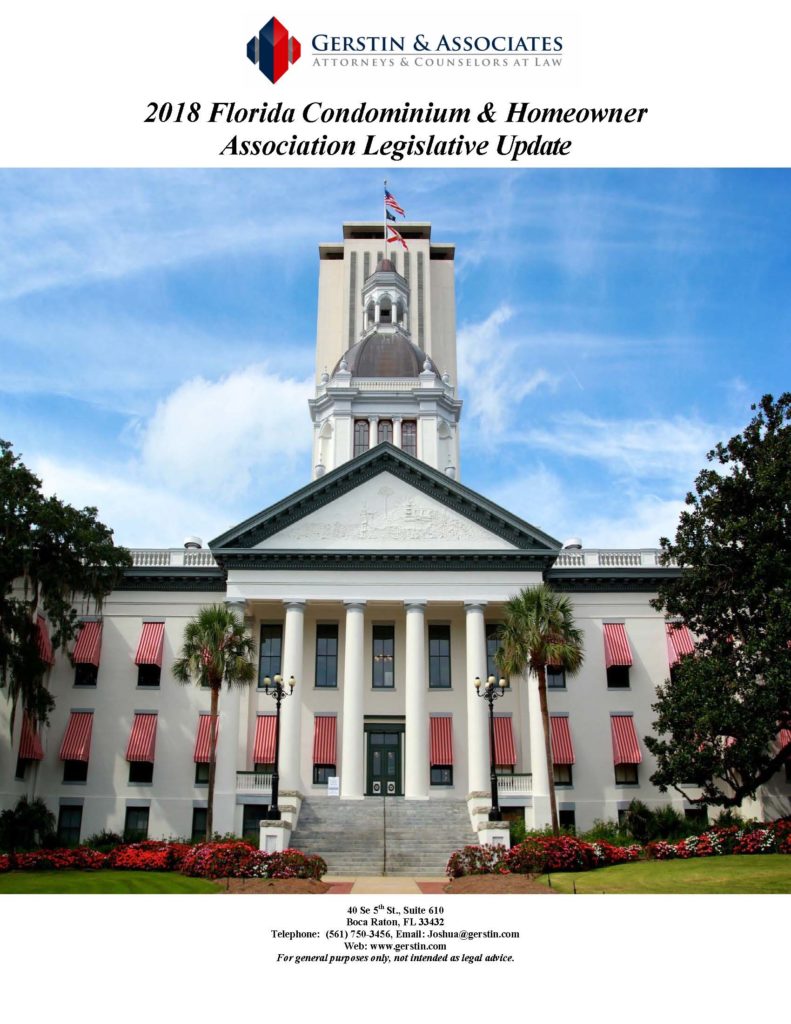
Click here for .pdf version
The following will become law on July 1, 2018.
Fines and Suspensions – Condominiums § 718.303
Now mirrors Florida HOA law- A condominium association’s committee of unit owners who determine whether to confirm or reject a fine or suspension levied by the board must be made up of at least three members who are appointed by the board, and are not officers, directors, or employees of the association, or a spouse, parent, child, brother, or sister of an officer, director, or employee of the association. §718.303(3)(b). Fla. Stat.
Now mirrors Florida HOA law – A condominium association’s committee of unit owners who determine whether to confirm or reject a fine or suspension levied by the board must approve the fine or suspension by majority vote, otherwise the association may not impose the fine or suspension. §718.303(3)(b). Fla. Stat.
Now mirrors Florida HOA law- The condominium and cooperative association must provide written notice of any fine or suspension by mail or hand delivery to the unit owner and, if applicable, to any tenant, licensee, or invitee of the unit owner. §718.303(3)(b) Fla. Stat.
A fine approved by the committee of a condominium association is due 5 days after the date of the committee meeting at which the fine is approved. § 718.303(3)(b).
Fines and Suspensions – HOAs §720.305(2)(b), Fla. Stat.
A fine approved by the committee of an HOA, condominium, or cooperative association is due 5 days after the date of the committee meeting at which the fine is approved. § 718.303(3)(b). HOA Elections – § 720.306
If an election is not required because there are fewer or an equal number of candidates than vacancies, and nominations from the floor are not required, then write-in nominations are not permitted and the candidates will commence service on the board of directors, regardless of whether a quorum is attained at the annual meeting.
Payment of HOA Assessments – § 720.3085
The application of payments in HOA law (first to the interest accrued, then to any administrative late fee, then to any costs and reasonable attorney fees, and then to the delinquent assessment) applies notwithstanding the Uniform Commercial Code’s regulations on restrictive notations placed on or accompanying a payment. 720.3085(3)(b), Fla. Stat. This is intended to clarify existing law.
HOA Amendments to Governing Documents – § 720.306
A proposal to amend the governing documents of an HOA must contain the full text of the provision to be amended, with underlining of proposed new language and striking of proposed deleted language, unless the proposed change is so extensive and then a notation must be inserted indicating that the proposed amendment has substantial rewording. This is similar to condominium association law.
An amendment is effective when recorded in the public records of the county in which the community is located.
An immaterial error or omission in the amendment process does not invalidate an otherwise properly adopted amendment.
Required notices for amendments to the governing documents must be mailed or delivered to the parcel owner’s mailing address on the property appraiser’s website, or electronically transmitted if the parcel owner has consented in writing to receive notice by electronic transmission. 720.306(1)(g), Fla. Stat.
Communication by HOA Board Members –§ 720.303(2)(a).
Members of an HOA’s board of directors are allowed to use e-mail as a means of communication. However, a board member may not cast a vote on an association matter via e-mail. This mirrors condominium association law.
Notice of Board Meetings – Condominiums §718.112, Fla. Stat.
Condominium associations are allowed to adopt rules for noticing all board and unit owner meetings and meeting agendas on a website if the time requirements for physically posting the board meetings are met. Any rule adopted for website notice must include a requirement the association send an electronic notice in the same manner as a notice for a meeting of the members, which must include a hyperlink to the website where the notice is posted, to all unit owners whose e-mail addresses are part of the official records. Notice by website must be in addition to the other notice requirements. §718.112(2)(c)1, §718.112(2)(d)3. Fla. Stat.
A condominium unit owner who consents to receiving notice by electronic transmission is responsible for removing or bypassing any filters that block receipt of mass e-mails sent to members on behalf of the association for the purpose of giving notice. §718.112(2)(d)6. Fla. Stat.
Notice of Board Meetings – Homeowner Associations §718.112.
An HOA is allowed to give notice by electronic transmission to any parcel owner who provided written consent and a fax number or e-mail address to the HOA for such purpose. 720.303(2)(c)1., Fla. Stat.
Official Records of Condominiums § 718.111.
The deadline for condominium associations to make records available to unit owners is extended from 5 working days to 10 working days. §718.111(12)(b), Fla. Stat.
Electronic records relating to voting is included in the list of official records that must be kept by condominium and cooperative associations. §718.111(12)(a)12, Fla. Stat.
A condominium association must permanently maintain the following documents from the inception of the association (instead of just for at least 7 years):
A copy of the articles of incorporation, declaration, bylaws and rules of the association;
Meeting minutes; and A copy of the plans, permits, warranties, and other items provided by the developer at turnover. 718.111(12), Fla. Stat.
Condominium Board Members – § 718.112.
The provision that condominium association board members may not serve more than four consecutive 2-year terms is repealed. Condominium association board members may not serve more than 8 consecutive years, unless approved by an affirmative vote of unit owners representing two-thirds of all votes cast in the election or unless there are not enough eligible candidates to fill the vacancies. Board member terms are 1 year unless a longer term is permitted by the bylaws or articles of incorporation. 718.112(2)(d)2., Fla. Stat.
A cooperative director or officer is deemed to have abandoned their office if the officer or director is more than 90 days delinquent in the payment of any monetary obligation to the association. 719.106(1)(m), Fla. Stat. This mirrors condominium association law.
In residential cooperatives of more than 10 units, co-owners of a unit may not serve as members on the board at the same time unless the co-owners own more than one unit or there are not enough eligible candidates to fill vacancies on the board. 719.106(1)(a)1., Fla. Stat. This mirrors condominium association law.
Condominium Board Member Recall – § 718.112.
A board must hold a meeting within 5 business days of the unit owners’ vote or receiving a written agreement, in order to determine if the vote or written agreement is facially valid. If the board determines the vote or written agreement is facially valid, the recall becomes effective upon the conclusion of the board meeting. 718.112(2)(j), Fla. Stat.
If the board determines that the recall is not facially valid, the unit owner representative may file a petition for arbitration with the Division of Florida Condominiums, Timeshares, and Mobile Homes of the Department of Business and Professional Regulation (the “Division”), challenging the board’s determination on facial validity. 718.112(2)(j)4.
A recalled board member may challenge the facial validity of the written agreement to recall, the ballots filed, or the substantial compliance with the procedural requirements for the recall, by filing a petition with the Division. 718.112(2)(j)6.
If an arbitrator determines a board member’s recall is invalid, the recall is null and void and the board member must be immediately reinstated. A board member who successfully challenges a recall is entitled to reasonable costs and attorney fees from the respondents. An arbitrator may award reasonable costs and attorney fees to the respondents if the arbitrator determines a recalled board member’s request for arbitration is frivolous. 718.112(2)(j)6., Fla. Stat.
Condominium Websites – § 718.111.
The deadline for condominium associations to post certain documents to its website is extended from July 1, 2018 to January 1, 2019.
A condominium association’s failure to post required documents does not invalidate any action or decision of the board or its committees. 718.111(12)(g)4.
After bidding for materials, equipment, or services has closed, a condominium association must post on its website a list of bids received within the past year.
Summaries of bids for materials, equipment, or services must be posted on the website only if they exceed $500. A condominium association may post the complete copies of the bids in lieu of summaries of the bids.
Instead of posting on its website proposed financial reports to be considered at a meeting, the association must post any monthly income or expense statement to be considered at a meeting.
A condominium association or its agent is not liable for disclosing protected or restricted information unless the disclosure was made with a knowing or intentional disregard of the protected or restricted nature of the information.
Condominium Financial Reporting – § 718.111.
If a condominium association fails to comply with a request from the Division of Florida Condominiums, Timeshares, and Mobile Homes of the Department of Business and Professional Regulation (the “Division”) to provide, within five business days, a copy of the association’s financial report to the Division and to a unit owner who reports the association’s failure to provide a copy of such report within the required time, the association may not waive the annual financial reporting requirements for the fiscal year in which the unit owner’s request was made and the following fiscal year.
Alterations or Additions to Condominium Property – § 718.113.
If a condominium’s declaration does not provide a procedure to approve material alterations or substantial additions to condominium property, then approval by 75 percent of the voting interests must be obtained before the material alterations or substantial additions to the condominium property begin. This applies to condominium associations existing on July 1, 2018. 718.113(2), Fla. Stat.
Condominium Bulk Assignees and Bulk Buyer – § 718.707.
The time limit on acquisition of parcels for classification as a bulk assignee or bulk buyer is removed, extending the applicability of the bulk assignee and bulk buyer provisions indefinitely.
Electric Vehicles in Condominium Associations – § 718.113, § 718.121.
A condominium association may not prohibit a unit owner from installing an electric vehicle charging station within the boundaries of the unit owner’s limited common element parking area. Notwithstanding, the installation of an electric vehicle charging station is subject to a number of restrictions in the statute.
The installation of an electric vehicle charging station may not be the basis for filing a construction lien under Chapter 713, Florida Statutes, against the association, but a construction lien may be filed against the unit owner.
HB 7087
Inter-spousal Transfers: Exempts the transfer of homestead property between spouses from documentary stamp tax charges.
Multi-Parcel Ad Valorem Taxation: Among its provisions is the multi-parcel ad valorem tax initiative permitting the vertical subdivision of real property, and it also includes an abatement of taxes for residential improvements rendered uninhabitable by hurricanes during the 2017 season.
Stay one step ahead of new legislation, recent case law and new developments that impact your community association.
Name: _________________________________________________
Mailing address: ________________________________________
E-mail address: _________________________________________
Community name: ________________________________________
Position on board, if any: __________________________________
Fax this completed page to (561) 750-8185 or email the above information to joshua@gerstin.com.


